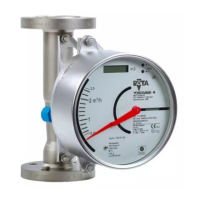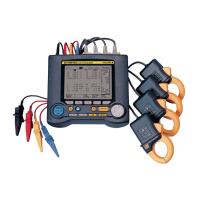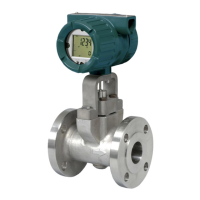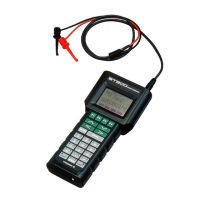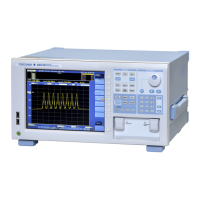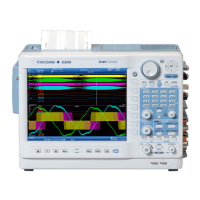16-40
IM 765501-01E
16.2.13 Common Command Group
16.2 Commands
*IDN?
Function Queries the instrument model.
Syntax *IDN?
→ Yokogawa Electric Co.,765501,serial
number,firmware revision
Example *IDN?
*OPT?
Function Queries the options.
Syntax *OPT?
→ NONE = No options
/C10 = Ethernet option
Example *OPT?
*TRG
Function Generates a trigger.
Syntax *TRG
Example *TRG
Description Carries out the same action as the trigger key
on the GP-IB panel. The GP-IB GET (Group
Execute Trigger) is also equivalent.
*CAL?
Function Performs calibration and queries the result.
Syntax *CAL?
→ 0 = Calibration successful
Value other than 0 = Calibration failed
Example *CAL?
*TST?
Function Performs a self-test and queries the result.
Syntax *TST?
→ 0 = Self-test normal
Value other than 0 = Self test error
Example *TST?
*RST
Function Resets the GS610 to factory default settings.
Syntax *RST
Example *RST
Description This command is equivalent to setting the file
name of the :SYSTem:SETup:LOAD command
to “Default.txt.”
*SAV
Function Saves the settings.
Syntax *SAV 1|2|3|4
1 = Saves the settings as Setup 1.
2 = Saves the settings as Setup 2.
3 = Saves the settings as Setup 3.
4 = Saves the settings as Setup 4.
Example *SAV 3
Description This command is equivalent to setting the file
name of the :SYSTem:SETup:SAVE command
to “Setup1.txt” to “Setup4.txt.”
*RCL
Function Loads the saved settings.
Syntax *RCL 1|2|3|4
1 = Loads Setup 1.
2 = Loads Setup 2.
3 = Loads Setup 3.
4 = Loads Setup 4.
Example *RCL 3
Description This command is equivalent to setting the file
name of the :SYSTem:SETup:LOAD command
to “Setup1.txt” to “Setup4.txt.”
*CLS
Function Clears the event register and error queue.
Syntax *CLS
Example *CLS
*STB?
Function Queries the status byte and clears the SRQ.
Syntax *STB?
→ <Integer>
Example *STB?
Description For details, see section 16.3. GP-IB Serial
polling carries out the same action as this
command.
*SRE?
Function Sets the service request enable register or
queries the current setting.
Syntax *SRE <Integer>|<Binary/Octal/
Hexadecimal>
*SRE?
→ <Integer>
Example *SRE 255
*SRE?
Description For details, see section 16.3.
*ESR?
Function Queries the standard event register and clears
the register.
Syntax *ESR?
→ <Integer>
Example *ESR?
Description For details, see section 16.3.
*ESE
Function Sets the standard event enable register or
queries the current setting.
Syntax *ESE <Integer>|<Binary/Octal/
Hexadecimal>
*ESE?
→ <Integer>
Example *ESE 255
*ESE?
Description For details, see section 16.3.

